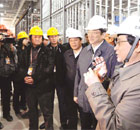Opinion
Going toe to toe with the bully
By Lim Ewe Ghee (China Daily)
Updated: 2010-05-03 14:50
 |
Large Medium Small |
Recently, the United States postponed its expected branding of China as a currency manipulator for selling cheap goods to US consumers at fixed rates. But the US has threatened China with trade sanctions, which will likely set off a trade war.
US mercantilists and their political, academic and media allies are decrying China's surpluses and claiming that the yuan is undervalued.
So, how does China succeed from being victimized by the US, unlike other Asian economies before it? How does it deal with the thuggish return of the 800-pound economic gorilla? By not caving in.
If China caves in now to the current round of bashing from the US, it will create expectations and pressure on China to cave in again and again in the future. This will lead to unending pressure on the currency and ultimately economic dilemmas.
In 1994, China fixed its yuan at 8.68 per dollar to stabilize its inflation rate; before that, its inflation rate was high and had spiked to 20 percent annually. The policy worked. By 1996, inflation had fallen in with US inflation. During the 1997-98 Asian crisis, China held firm to the policy despite pressure to devalue. The move gave China credibility and financial stability after the crisis. The yuan's value was certain and the nation could focus on improving productivity, quality and cutting costs.
A curious observer might ask: What's not to like about hordes of rural Chinese laborers flooding into world markets? What's not to like about hordes of US working families flooding discount stores to gobble up cheap consumer goods that raise living standards?
Enter in US special interest groups. China-bashing became intolerable around March 2005 when the US Congress threatened a 27.5-percent tariff on all imports from China unless the yuan was substantially appreciated. China acquiesced and the yuan appreciated 22 percent over three years. The trade surplus, however, widened. Special interest groups then began to call for another yuan appreciation of around 20-40 percent.
But why is the yuan undervalued now, but not in 1994? And not from 1997-98 or anytime before the large surpluses? Why did the US not protest when the policy was first implemented? The answer is that the policy was standard fare until China became too competitive for the US' special interest groups.
Another baseless argument from within the US is the demonization of fixed rates as a means of currency manipulation.
There is absolutely nothing manipulative about fixed exchange rates. In addition, the special interest groups have used the basic operations of fixed exchange rate systems to prove that China manipulates currency. Under fixed rates, central banks must buy excess foreign exchange or sell foreign exchange to meet excess demand.
By that definition, most countries in the world manipulate currency because they either fix or have managed floats. A fully flexible yuan would not eliminate the trade surpluses but only introduce volatility for China, particularly given its thin, underdeveloped financial markets.
So why the fuss about a floating yuan? Critics within the US insinuate that surpluses require appreciation. But nothing ensures that an appreciation alone will shrink the current excess of Chinese savings over investments needed to reduce the surplus. Falling exports from appreciation may cause Chinese incomes and savings to fall, but investments (and imports) would also likely fall.
Then, investments could easily shift operations abroad where things would be cheaper. The upshot: If China caves or appears to have caved, it would likely deflate into recession.
Here are my solutions. First, China should ignore the bashers. Second, it should look inward. What does the economy need? Exchange rate policy cannot be decided independently of other macroeconomic policies (like monetary policy) and concerns such as asset and goods inflation.
Notwithstanding its well-known fiscal problems, the US economy is the juggernaut of production and innovation in the history of mankind. It is a pity that every time this economic juggernaut encounters successful international competition in manufacturing, it resorts to bullying against its own consumers' welfare and that of the working poor worldwide.
Therefore, the US too needs to look inward. It has to rein in those special interest groups; it has to reform its tax system to encourage instead of discourage savings; it has to rationalize its Social Security and Medicare systems, which also discourage personal savings. Finally, it has to stop bashing and bullying successful international competitors. The world is catching on. After Japan and China, who will be next? India? Enough is enough.
The author is a senior research fellow at the Center for Policy Research and International Studies, Universiti Sains Malaysia.













